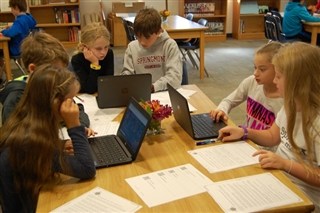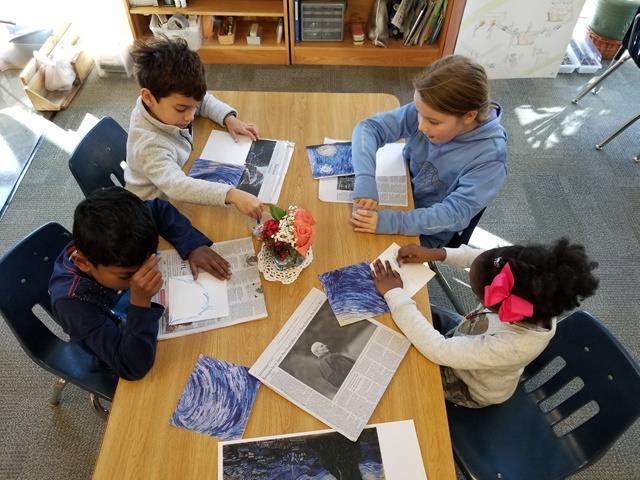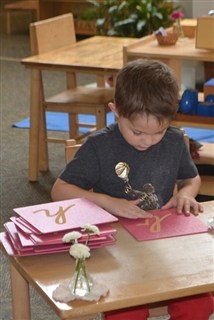News
News
Ask a Division Head: How Do Elementary Students Use Technology at Springmont?

Springmont is conscientious and intentional, using technology to positively impact your children’s best development at each stage of their learning. Our Elementary classrooms are equipped with computers and Keyboarding without Tears (KWT), a well-vetted, award-winning digital communication program. This developmentally-based program includes learning fluent typing, computer functions, formatting texts and digital citizenship. Every child has an individual user account so that he can move forward step-by-step through a series of grade-appropriate skills each year. Parents are given password access to allow 10 minutes daily practice for their child at home.
In Lower Elementary, students learn
• Two-handed typing with correct finger placement,
• Cross-curricular content in language arts, social studies and other subjects, and
• Self-directed, game-based lessons that add motivation and encouragement.
In Upper Elementary, students continue using KWT to
• Improve typing speed and fluency,
• Develop skills needed for computer-based testing, and
• Expand skills needed for writing longer passages.
Social responsibility and discriminating digital behavior are essential to appropriate use of technology. Throughout their Elementary years, our students learn digital citizenship from their classroom Teachers, Springmont Media Specialist Leslie Wachter and the KWT program.
Visiting the Media Center, students learn how to choose reliable resources, both in print and digital forms, and to use the computer as a scholarly tool. In Lower Elementary, children learn the basics of gathering information and writing about a chosen topic. In Upper Elementary, students are instructed on the more formal steps of a research project and expand their searches to include online resources. They learn to use EBSCO, an online database, to do in-depth, online research, developing great skill in narrowing their search and vetting websites for legitimacy. As they complete their sixth year, students present at least one research project using PowerPoint.
Would children be well-served by spending more school hours in front of screens? Although many educators have opinions, there is no research that says this is so. See two opposing views here.
Daily, we see that Springmont students of all ages are “engaged in powerful learning experiences and … given voice and choice in what and how they learn.” Springmont children are thoughtful users of technology. We know from our alumni that the years spent learning to think clearly, glean concepts from studies, collaborate with peers, innovate and connect ideas are invaluable, and that when our students begin to use technology even more frequently, they adapt easily and readily
Our Spring Auction is April 14!

Mark your calendars for this not-to-be-missed evening of Parisian-themed fun and fund-raising. Students are already hard at work creating beautiful class projects for the Live Auction, and we invite parents to contribute to the evening's success, too! Consider becoming a Sponsor. Donate an item to the Silent Auction. Most importantly, plan to attend! Your support translates into campus features for all to enjoy!
Middle School INternships
Each February, Springmont's Middle School students look forward to participating in a distinctive internship experience. At other schools, these tastes of the real-world are often reserved for high school students, but at Springmont, we recognize that developing the skills needed for a productive life and connecting academic pursuits and interests with future career paths is best begun earlier.
While seventh-year students assist in classrooms and administrative offices on campus, eighth-year students spend the three days off campus in a variety of roles. Last year, students interned at Marietta Sports Cars, Dunwoody Animal Hospital, High Point University in North Carolina and Zeropoint Renewable Energy/Green Technology in Amsterdam to name just a few of the exciting opportunities experienced.
Upper Elementary STEAM Experience

Back by popular demand - Upper Elementary students are invited to an afternoon of hands-on learning with Springmont's Middle School Math and Science Teachers. This fun opportunity will allow students to learn more about the human circulatory system and use computer graphing software and math functions to create company logos. Make sure to register!
Share Springmont Week!

Thank you for sharing your family’s Springmont experience with friends, neighbors and colleagues. Pique their curiosity by sharing your own unique story. Encourage them to schedule a Tour or come to an Open House. With your help, more students will find Springmont - a learning environment that inspires a lifetime of Curiosity, Mastery, Wisdom and Distinction.
Share Springmont Week!

Thank you for sharing your family’s Springmont experience with friends, neighbors and colleagues. Pique their curiosity by sharing your own unique story. Encourage them to schedule a Tour or come to an Open House. With your help, more students will find Springmont - a learning environment that inspires a lifetime of Curiosity, Mastery, Wisdom and Distinction.
International Night - Feb 3, 4:30

Don't miss this school-wide, family event - one of Springmont's most beloved traditions! International Night is a celebration of community, diversity and music. Held off-campus at Peachtree Road United Methodist Church, International Night features musical performances by Primary, Elementary and Middle School students and a delicious potluck dinner.
Guest Speaker Michael Thompson - Jan. 16

Dr. Michael Thompson, preeminent child psychologist and New York Times best-selling author will present Best Friends/Worst Enemies: Friendship Development, Popularity and Social Cruelty in Childhood on January 16, beginning at 6:30 p.m.
Friendship difficulties and social cruelty among children are some of the most challenging things parents face in raising children. Can you protect your child from social pain? Are you dreading the popularity wars of middle school? How involved should you be in your child’s social life? Michael Thompson will address these questions and more, walking parents through the complex social world of childhood and adolescence.
Adults only, please. Wine & cheese will be served.
Ask a Division Head: How Does Springmont Prepare Students to Read?

Springmont students begin to develop reading readiness skills as very young Primary students. In the Practical Life area, children learn to complete tasks from beginning to end and to coordinate eye movements by moving left to right. Sensorial materials provide opportunities to observe subtle similarities and differences leading to the skills needed to identify letters and to notice word patterns. Primary children are given more and more complex tasks, allowing them to extend their ability to concentrate for longer and longer periods of time.
Simultaneously, children are exposed to the richness of the English language through songs, poems, books and storytelling as well as the numerous conversations and daily social interactions between the children and teachers. For example, a teacher may guide a young student who is sharing a story about his trip to the beach to include as many details as possible using as much descriptive vocabulary as he is able.
Our multi-aged classrooms expose students to children in various stages of reading which aides in building the confident “I can do it” attitude vital to reading readiness. Teachers guide students to discover their reading skills as they play learning games like “I spy with my little eye…something that begins with the sound 'b'”, a fun exercise in which the student is exposed to word sounds well before being given a lesson with the Sandpaper Letters. Often students are capable of “writing” down their thoughts using the Moveable Alphabet before they are ready to decode and before their fine motor skills are ready to write using pencil and paper. “Writing” or taking words apart through encoding allows children to discover that reading is simply the reverse, putting sounds together to form words via decoding.
You can help your child at home by playing rhyming games - “I’m thinking of something on the table that rhymes with moon.” (spoon) – or by playing “I Spy” - “I spy with my little eye something that start with the sound ‘t’.” (tree). As your child becomes proficient with initial sounds, you can play “I Spy” with ending or middle sounds. Your child will eventually be ready for complex challenges such as “I’m thinking of something that has these three sounds ‘cuh’, ‘aaa’, ‘tuh’.” (cat). Clapping out syllables (banana = 3 claps, pumpernickel = 4 claps) is a fun way to build your child’s awareness of syllables. And most importantly, read to your child each day, before, during and even after they become independent readers.


1 day ago
2 days ago